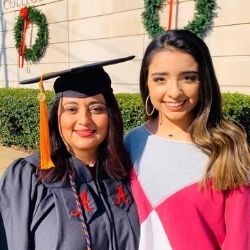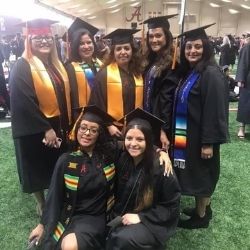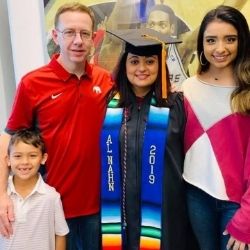 Early in life, Sonia Turner recognized the educational challenges she faced as a young Latina in the U.S.
Early in life, Sonia Turner recognized the educational challenges she faced as a young Latina in the U.S.
“My parents didn’t speak English. Homework, extra help – we didn’t have any of that from our parents because they couldn’t help us. For my siblings and me, we had to figure it out on our own. Our parents always had our back, but unfortunately, they did not speak or write English. I realized at a young age that I would have to do that for myself.”
Sonia’s parents were migrant workers primarily located in Texas but they traveled to Alabama in the summers for work. From the time she was seven years old, her family worked at a potato shed in Henagar, Alabama between school years. When she was 10, her father accepted a year-round job with Storey Farms there, but the rest of the family spent most of the year in Texas. Five years later, at just 15 years old, Sonia made the difficult decision to stay with her father in Alabama while her mother and other siblings returned to their home.
“Neither of my parents had an education. I decided to stay in Alabama so I could work and pursue an education. It was difficult for my mother and for me, but I felt like it was what I needed to do to get my education and break the chain.” Sonia attended Sylvania High School and worked at a sock mill in Fort Payne. She married and had her daughter Ashley as soon as she finished high school. A young mother with little support, she put off higher education for several years.
While continuing to work full time, she later completed a program at Northeast Alabama Community College to become a licensed practical nurse. Sonia began working at a health and rehab center until she completed the registered nurse program at Northeast Alabama Community College. She worked as a medical-surgical nurse for five years at Dekalb regional medical center, and she now works as an RN at Fresenius Kidney Care.
In 2018, she heard about the BAMA-Latino Project, a $1.7-million grant at The University of Alabama’s Capstone College of Nursing intended to increase the number of Latino nurses holding a BSN. Because UA offers the RN to BSN 100% online, registered nurses can earn the Bachelor of Science in Nursing around their schedules (Funding for the BAMA-Latino Project ended with the 2020-2021 school year). The BAMA-Latino Project provided increased access for Sonia and others like her by paying for tuition. It also provided support by connecting them to resources and peers.
“One of the grant requirements was to be a member of the National Association of Hispanic Nurses (NAHN), and that has been an asset for me. I’ve met so many other nurses like me. You don’t see a lot of Hispanic nurses where I live, but I’ve met Latina nurses who have their master’s and doctorates and are nurse practitioners!” Through her NAHN membership, Sonia was able to connect more deeply with Dr. Norma Cuellar, UA faculty member and the founder of the BAMA-Latino Project, who she calls a personal role model. “She has been a constant support for me.”
In December 2019, Sonia graduated with her BSN from UA, and she and her family came to Tuscaloosa for graduation. “I never imagined I could graduate from Alabama. The feeling was amazing. There are so many opportunities out in the world. Living in a rural area, sometimes you can miss out on a lot. But the RN distance program brought those opportunities to me,” she said.
 Inspired by the Latinas she met through NAHN and encouraged by her own success, she began UA’s primarily online Master of Science in Nursing (Nurse Practitioner – Family Nurse) program in Fall 2020. She is nearly halfway through the five-semester program and begins her clinical requirements this summer. Her daughter Ashley is a main campus student at UA and if all goes according to plan, they are on track to graduate together in May 2022.
Inspired by the Latinas she met through NAHN and encouraged by her own success, she began UA’s primarily online Master of Science in Nursing (Nurse Practitioner – Family Nurse) program in Fall 2020. She is nearly halfway through the five-semester program and begins her clinical requirements this summer. Her daughter Ashley is a main campus student at UA and if all goes according to plan, they are on track to graduate together in May 2022.
As a full-time nurse and busy mom, Sonia has learned that time management is critical for success. “I have to set a strict schedule and sometimes that means I have to say no to social outings. You have to stay on top of it; you can’t procrastinate in online classes.” Even with her strict schedule, she makes it her goal to never miss a game or practice for her 7-year-old son, Evan, an ideal she can achieve thanks to the program’s online coursework. “It’s very challenging, but it’s doable. And it’s rewarding. I’ve learned that I love to learn. And if UA didn’t have these online classes, I probably never would have done it.”
For Sonia, education has been the key to moving her life forward. It’s how she landed in Alabama, how she met her husband, and how she “[broke] the chain” and improved her family’s quality of life.
“I never dreamed I would be a nurse practitioner one day. It’s all been God’s plan. He has made it possible for me to do this.”
Published: June 7th, 2021

